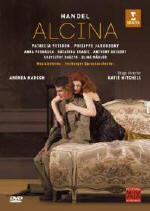Texte paru dans: / Appeared in: |
|
 |
Outil de traduction (Très approximatif) |
|
Reviewer: Alexandra Coghlan
Opera on film is an awkward compromise of an art form. At worst it’s just an architect’s plan, an aide mémoire that preserves the outline of a production but nothing more. At best, though, it can actually heighten the dramatic essence of a show, bringing us – both literally and figuratively – closer to core of the action. Three new Handel DVDs reflect this strange disparity, ranging from the adequate to the theatrically outstanding.
If ever there was an opera production made for the probing, roving eye of the camera, it’s Katie Mitchell’s Alcina, originally staged in 2015 at the Aix Festival. The director’s signature visual detail, coupled with her emphasis on psychological truthfulness, means that every close-up yields more intrigue, more insight into Handel’s troubled cast of characters. Wide shots allow our eyes to drift over Mitchell’s broken-down doll’s house of a set. Five rooms, split over two levels, are filled with almost constant action; and though the panelled and painted Georgian salon is the only one fully lit, it’s elsewhere – in the crumbling, decaying ‘backstage’ spaces of sorceress
Alcina’s magic domain – that the real interest lies.
Double-casting both Alcina and Morgana, Mitchell pulls off a sleight of hand as bold as it is telling, giving us both the illusion of youth and beauty (in singers Patricia Petibon and Anna Prohaska) and the reality of decrepit old age (actresses Juliet Alderdice and Jane Thorne). As the characters pass between rooms they also pass seamlessly between performers, exposing the fragile fabric of Alcina’s sorcery.
For all that it’s a magic opera,
Alcina is, ultimately, a story of human psychology, of the illusions and horrors
that exist in the mind. With the support of Andrea Marcon and the Freiburg
Baroque Orchestra and a superb cast of singing actors (including a mesmerising
Petibon, though her vocal tricks won’t be to everyone’s taste, Katarina Bradic’s
Bradamante and Philippe Jaroussky as a deliciously vapid Ruggiero), Mitchell’s
concept becomes heartbreaking reality – a portrait of women imprisoned in a
palace and a narrative of their own making. When the camera creeps right in,
refusing to blink away Alcina’s sagging skin and greying hair, catching the
self-disgust in her eyes, no amount of beautiful melodies or spectacular ariosos
can temper the devastation we feel along with her. |
|
|
Consultez d'autres mois / Browse other months
|
|
|
|
|
|
Cliquez l'un ou l'autre
bouton pour découvrir bien d'autres critiques de CD |
|




